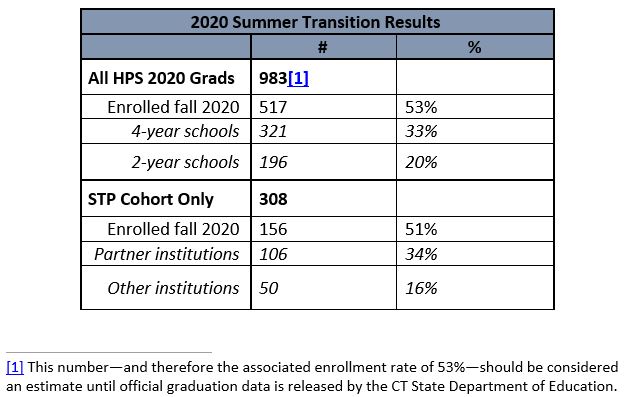Philanthropy, Nonprofits & HPS Unite to Help Class of 2021 Prepare for Future
This year, more than any other, is especially tough for those Hartford Public Schools’ seniors without plans for college or military service after graduating. School guidance counselors had to work harder to reach students learning remotely, and even in the best years, the student-to-staff ratio stretches guidance counselors thin. What support is there for seniors who aren’t pursuing the traditional college route?
In February, the ALL IN! Coalition partners, with financial support from its Funder Advisory Committee, launched the Hartford Student Internship Program (HSIP) & Class of 2021 program with the goal of reaching up to 300 of those seniors to place them in a post-secondary program. Capital Workforce Partners (CWP,) which has historically led the HSIP, took the lead and received carry-over financial support from the Hartford Foundation for Public Giving and the City of Hartford. Other funders stepped in to help launch the program, including The Travelers Foundation, The Hartford, Social Venture Partners, Liberty Bank and Lincoln Financial.
With CWP coordinating the effort, staff from Blue Hills Civic Association and Center for Latino Progress have knocked on doors and reached out to seniors to enroll them in the program; it offers up to 13 content modules, where students receive $35 stipends for each module attended, as well as 60-hour internships that pay students $12 an hour. Modules offer a mix of career competency training, employment management training and post-secondary program exposure and placement.
Many students have to work to help support their families, so to encourage students to participate and stay engaged throughout the final marking period of their senior year, the program prioritized financial incentives for students and their families.
In total, students in the program will receive:
- $35 per content module completed at their own pace done in live workshops, recorded webinars, small-group meetings or 1:1 sessions with community-based organization staff, for up to $505 in earnings.
- Eligibility for internships in the spring, which pay $12/hour for up to 60 hours of work, up to $720 in earnings.
- Eligibility for early application for Summer Youth Employment, up to $1,500 in earnings.
- Placement in other paid career pathway programs after high school such as apprenticeship, trade skills, industry certificate and job-training programs.
- Career Readiness Training on key topics such as time- and self-management, professional communications, resume writing, interviewing and more.
By graduation, the participating students will have gained skills, experiences and connections to prepare them for work, on-the-job training and the possibilities beyond low-wage, low-growth jobs. This effort would not have been possible without the support of the program’s funders and partners.





